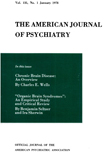HALOPERIDOL IN THE PSYCHIATRIC DISORDERS OF OLD AGE
Abstract
The effects of haloperidol in the management of elderly patients with chronic brain syndrome with cerebral arteriosclerosis or senile brain disease were investigated in an initial open phase (6 patients) and a subsequent randomized double-blind placebo-controlled phase (18 patients). Haloperidol appears to be an effective compound in patients who are agitated, overactive and hostile. Side effects include sedation and extrapyramidal symptoms. The dose level should be considerably lower than that generally used in schizophrenic patients and should probably not exceed 4 mg. daily. Maintenance doses of about 1 mg. daily appear adequate in most cases. Hypotension was not a complication and no untoward effects on liver function or bone marrow were noted.
Access content
To read the fulltext, please use one of the options below to sign in or purchase access.- Personal login
- Institutional Login
- Sign in via OpenAthens
- Register for access
-
Please login/register if you wish to pair your device and check access availability.
Not a subscriber?
PsychiatryOnline subscription options offer access to the DSM-5 library, books, journals, CME, and patient resources. This all-in-one virtual library provides psychiatrists and mental health professionals with key resources for diagnosis, treatment, research, and professional development.
Need more help? PsychiatryOnline Customer Service may be reached by emailing [email protected] or by calling 800-368-5777 (in the U.S.) or 703-907-7322 (outside the U.S.).



